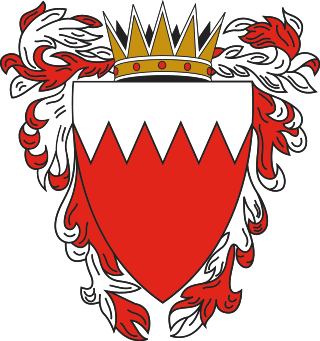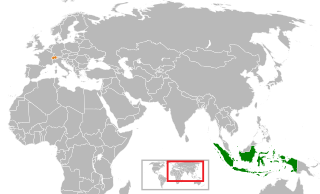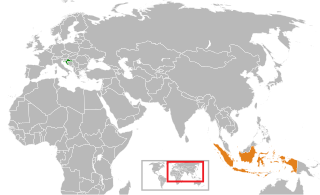
The economy of Bahrain is heavily dependent upon oil and gas. The Bahraini Dinar is the second-highest-valued currency unit in the world. Since the late 20th century, Bahrain has heavily invested in the banking and tourism sectors. The country's capital, Manama is home to many large financial structures. Bahrain's finance industry is very successful. In 2008, Bahrain was named the world's fastest growing financial center by the City of London's Global Financial Centres Index. Bahrain's banking and financial services sector, particularly Islamic banking, have benefited from the regional boom driven by demand for oil. Petroleum is Bahrain's most exported product, accounting for 60% of export receipts, 70% of government revenues, and 11% of GDP. Aluminium is the second most exported product, followed by finance and construction materials.

Bahrain plays a modest, moderating role in regional politics and adheres to the views of the Arab League on Middle East peace and Palestinian rights. Since achieving independence in 1971, Bahrain has maintained friendly relations with most of its neighbours and with the world community. It generally pursues a policy of close consultation with neighbouring states and works to narrow areas of disagreement.

Hungary–Indonesia relations refer to bilateral relations between Hungary and Indonesia. The two countries established diplomatic relations in 1955. A Hungarian embassy was opened in Jakarta in 1957. In line to Hungarian "Eastern Opening" policy, and due to Indonesian political weight and market potentials, Hungary considered Indonesia as one of the most influential states in the ASEAN. While Indonesia sees Hungary as a potential market and a strategic entrance to penetrate the markets of Central Europe and Eastern Europe. Hungary has an embassy in Jakarta and honorary consuls in Bandung and Denpasar, while Indonesia has an embassy in Budapest.

Foreign relations exist between Bahrain and Turkey. Turkey's historic relationship with Bahrain has wavered between indifference and courtship, but the constant has been a layer of mistrust emanating from both ends that appears to have been set aside in 2002 when the new Turkish government reversed the status quo and embraced a policy of engagement that has successfully catapulted the country to becoming a leading economic player in the Bahrain.

Indonesia and the United Arab Emirates (UAE) established diplomatic relations in 1976. The diplomatic relations are important because both share the solidarity as Muslim majority countries. Indonesia has an embassy in Abu Dhabi, while the United Arab Emirates has an embassy in Jakarta. Both countries are members of the World Trade Organization (WTO), The Non-Aligned Movement and Organisation of Islamic Cooperation (OIC).

Indonesia and Venezuela established diplomatic relations in 1959. Since then, both countries enjoy friendly ties. Both nations agreed to expand the trade and investment relations, especially in tourism, technology, chemicals and natural gas sectors. Indonesia has an embassy in Caracas, while Venezuela has an embassy in Jakarta. Indonesia and Venezuela are members of multilateral organizations such as the World Trade Organization (WTO), Non-Aligned Movement and Forum of East Asia-Latin America Cooperation.

Indonesia and Switzerland established diplomatic relations in 1952. In 2010, the heads of state of the two countries agreed to launch negotiations on a Comprehensive Economic Partnership Agreement (CEPA). Switzerland has named Indonesia as one of seven priority countries for economic development cooperation. Indonesia has an embassy in Bern, while Switzerland has an embassy in Jakarta, also accredited for East Timor and ASEAN.

Indonesia and Tanzania established diplomatic relations on 25 January 1964. The relations between both nations are mostly in the agriculture sector, where Indonesia provides training for Tanzanian farmers. In 2011 both countries established Indonesia-Tanzania Joint Agriculture Cooperation Committee (JACC), as a vehicle to improve agricultural sector co-operations, such as capacity building through training, joint research, and the expansion of market access to agricultural products. Indonesia has an embassy in Dar es Salaam. Tanzania has a non-resident ambassador in Kuala Lumpur, Malaysia. Since 2023, Tanzania had opened an embassy in Jakarta. Both countries are members of multilateral organisations such as World Trade Organization (WTO), the Group of 77 and Non-Aligned Movement.

Indonesia and Iran established diplomatic relations in 1950. Indonesia has an embassy in Tehran, and Iran has an embassy in Jakarta. Both countries are full members of the World Trade Organization (WTO), The Non-Aligned Movement, Organisation of Islamic Cooperation (OIC), and Developing 8 Countries.

Foreign relations exist between Bahrain and Malaysia. Bahrain has an embassy in Kuala Lumpur, and Malaysia has an embassy in Manama. Malaysia also are the strong supporters to the Bahrain national dialogue during the 2011 civil unrest and willing to send a peacekeeping forces to help the country. Both countries are members of Organisation of Islamic Cooperation.

Indonesia and Peru established diplomatic relations in 1975. Both nations see each other as an attractive market with good prospects and potentials, and seeks to boost trade relations. Indonesia has an embassy in Lima, while Peru has an embassy in Jakarta. Indonesia and Peru are members of multilateral organizations such as the Asia-Pacific Economic Cooperation, the World Trade Organization (WTO), Non-Aligned Movement and Forum of East Asia-Latin America Cooperation.

Fiji and Indonesia established relations on 17 June 1974. At that time, the Indonesian mission to Fiji was accredited through the Indonesian embassy in Wellington, New Zealand. On 22 August 2002, Indonesia opened their embassy in Suva. Fiji reciprocated by opening their embassy in Jakarta on 6 April 2011 which is also accredited to East Timor and Singapore.

Indonesia and Serbia established diplomatic relations in 1954, with the legal frameworks was inherited from the Yugoslavian era. Indonesia has an embassy in Belgrade and Serbia has an embassy in Jakarta. Both nations are the founders of Non Aligned Movement.

Croatia and Indonesia established diplomatic relations in 1992. Croatia sees Indonesia as one of the largest and the most influential nation in ASEAN, and recognized its potential as the gate to enter ASEAN markets. Vice versa, Indonesia also recognizes Croatian potential as a strategic gate to penetrate Balkans and European Union market. Croatia has an embassy in Jakarta, while Indonesian embassy in Zagreb was established in 2010.

Indonesia–Oman relations was officially established in 1978. Indonesia and Oman are Muslim majority countries and shares same commitment in pursuing global peace and prosperity. Indonesia has an embassy in Muscat, while Oman has an embassy in Jakarta. Both countries are the member of Organization of Islamic Cooperation and also Non Aligned Movement.

Historic and current bilateral relationship exist between Bahrain and Japan. Diplomatic relations were first established in 1972, and since then they have had increasing economic, cultural, and military cooperation, with Japan becoming one of the major trading partners of Bahrain. Several high-level official visits have taken place, including by King Hamad bin Isa Al Khalifa to Japan in 2012, Crown Prince Salman in 2013, and Prime Minister Shinzo Abe to Bahrain in 2013, with the governments of both countries expressing their intent to continue to increase their bilateral relations.

Historic and current bilateral relationship exist between Bahrain and Iraq. In recent years relations between the two have been mixed, with the Bahraini government criticizing what it sees as Iraq's interference in its internal affairs, especially since the 2011 uprising. Both countries have Shi'ite majority population and are part of the Organization for Islamic Cooperation.

China – Qatar relations are the bilateral relations between the People's Republic of China and the State of Qatar. China has an embassy in Doha, while Qatar has an embassy in Beijing. With diplomatic relations first formed in 1988, Qatar is a strategic ally of China, and the two countries maintain a strong relationship.

The kingdoms of Bahrain and Thailand share bilateral relations, established diplomatically in 1972. Thailand has an embassy in Manama and Bahrain has an embassy in Bangkok.

Bahrain-Germany relations have existed since 1972 and are described as "good" by the German Foreign Office. Germany enjoys a good reputation in the country of Bahrain, and the German economy in particular is highly regarded.






















